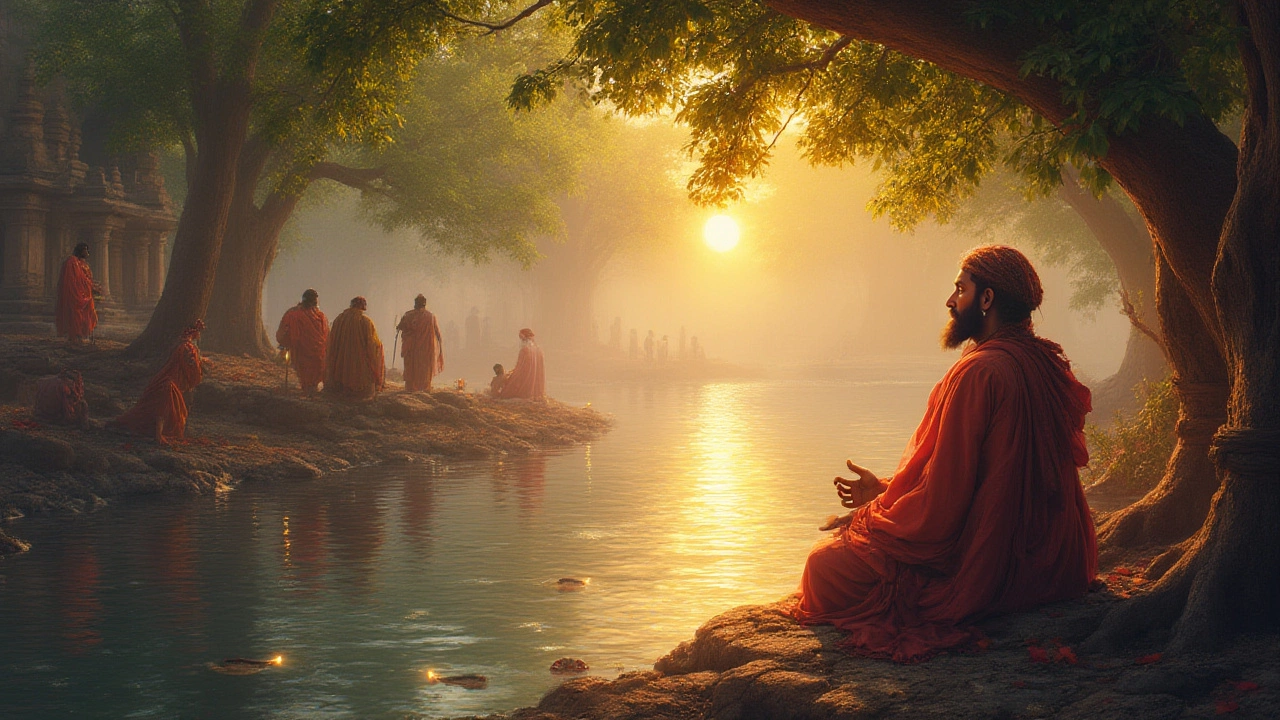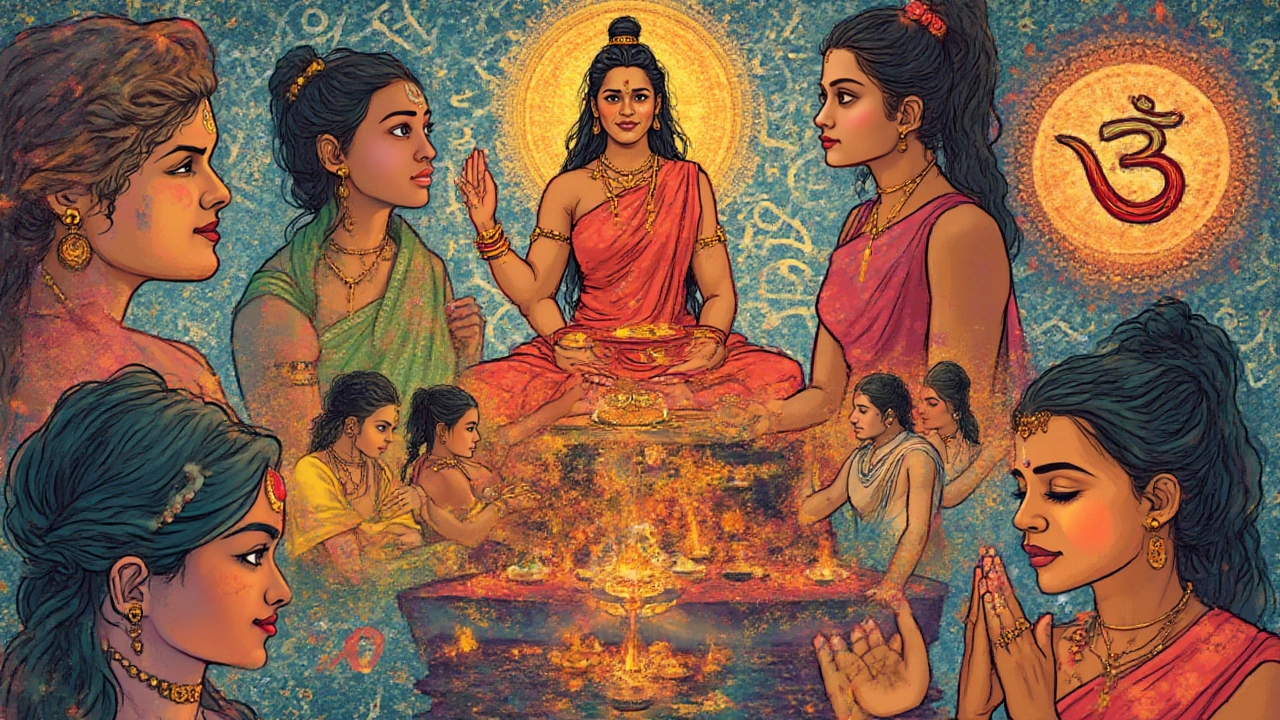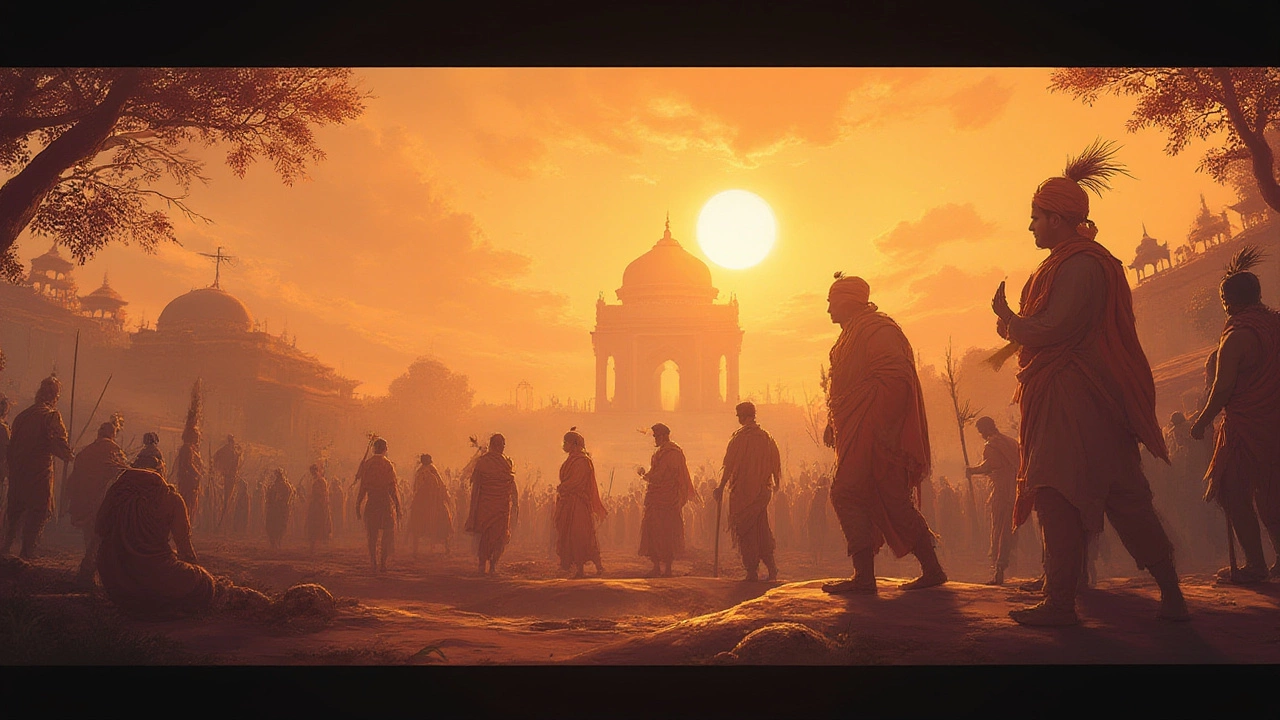Who Founded Hinduism? Unraveling History and Origins of the Ancient Religion

Ever wondered who started Hinduism? Try asking this question in an Indian chai shop and see an old man chuckle behind his glasses. Unlike religions with founders—Jesus for Christianity, Muhammad for Islam, Buddha for Buddhism—Hinduism dodges that simple answer. There's no signed document or grand birth date to circle on a calendar. Hinduism feels more like a winding river than a structure someone set in stone. It started before history had the tools to record anything solid, growing for thousands of years through stories, rituals, hopes, and fears that echoed through the Indian subcontinent. The fact is, you can’t pin it on one founder. That’s not a design flaw; it’s just how Hinduism works. This is a religion that never made a user manual or wrote a strict onboarding process. It’s sprawling, alive, and hard to fit into any single box.
Ancient Roots: Tracing Hinduism’s Story Back in Time
Let’s cut to the chase: Hinduism is probably the oldest living religion on earth. Most scholars peg its beginning at over 4,000 years ago. There’s no one person you can point to and say, “He started it.” Instead, the roots go deep—back to the Indus Valley Civilization, which flourished around 2500 BCE in what is now Pakistan and northwest India. Archaeologists found clay seals and figurines of people in yoga poses and animals, suggesting that spiritual beliefs were already a part of everyday life. These ancient people left almost no written records, so the exact beliefs are an educated guess, but they sure set the foundation.
Move ahead a couple of centuries, and the Vedic period comes in swinging. The Rigveda, a big deal in Hindu literature, was first composed around 1500 BCE (give or take a few generations; the dates are hazy). Forget iPhones and internet—these folks passed everything down by word of mouth, chanting the verses for centuries before anything was written. This period gave shape to many ideas that became central to Hinduism: gods like Indra, Agni, and Soma, plus the powerful force called Rita, which is cosmic order.
The religion wasn’t even called ‘Hinduism’ back then. People spoke Sanskrit, performed sacrifices, and recognized a spiritual world, but there was no branding, no single prophet to organize the movement. It was a patchwork evolving into something new every generation. By the time outside groups like the Persians and Greeks arrived, they lumped all these traditions together based on geography and called them “Hindu.” The actual word comes from the river Indus (called Sindhu by locals). So, it wasn’t a religion started by a founder; it was a massive, shared cultural process. If you want a comparison, it's like the way jazz evolved—nobody started it, but everyone kept adding to the groove.
Key Texts and Scriptures: The Heartbeat of Hindu Thought
The founder of Hinduism isn’t a person; it's the collective wisdom in its texts. Start with the Vedas, the oldest scriptures, which are divided into four big collections—Rigveda, Yajurveda, Samaveda, and Atharvaveda. Think of them as a playlist of chants, rituals, songs, and spells. These were meant to be sung or recited at ceremonies, not just read in silence. The Vedas set up a world where the cosmos is alive, rituals matter, and everything is woven together by hidden threads.
As centuries rolled on, more texts poured in. The Upanishads come next—these are like late-night philosophy chats by the fire. They dig deep into questions of life, death, the soul (called atman), and what it means to be connected to something infinite (Brahman). Hinduism’s big ideas about karma, moksha, and the cycle of birth and rebirth (samsara) are explored here. It’s pretty mind-blowing stuff, and it shaped how millions would experience the world.
Then come two epic poems: the Mahabharata and the Ramayana. It's hard to overstate how massive these are. The Mahabharata clocks in at over 100,000 verses—that’s longer than the Iliad and Odyssey combined! It’s full of war, love, gods dabbling in human affairs, and the famous Bhagavad Gita (a philosophical gem where Krishna delivers some of the deepest life advice you’ll ever hear). The Ramayana tells the story of Rama, a king who faces kidnapping, betrayal, and exile, all for the sake of honor and dharma (duty).
Later, the Puranas (like the Vishnu Purana, Shiva Purana, and Bhagavata Purana) popped up. They are like religious encyclopedias, stuffed with stories of creation, floods, heroes, demons, and holy places. It’s through these texts that many Hindu gods gained their unique personalities—Vishnu, Shiva, Devi, and a slew of others became central to beliefs across regions. What’s fascinating is that every region, even small villages, might have their own favorite version or twist, leading to an incredible variety across India and beyond.

Gods, Beliefs, and Practices: Beyond Any Single Founder
Ask a few Hindus about their religion, and you’ll get wildly different answers. One person might worship Krishna, another might see Shiva as the most powerful, while someone else could say all gods are just paths to the one truth. That’s the beauty (and headache) of Hinduism—there’s no one-size-fits-all. Unlike religions with strict doctrines, Hinduism feels more like a toolbox. Pick your rituals, find your festivals, adjust your beliefs to fit your locality, family history, or even mood.
There are literally thousands of gods in Hinduism, a fact that stuns outsiders. Some are big names—Vishnu, Shiva, Lakshmi, Parvati, Durga—and others are local legends. People build shrines in homes, at the base of trees, or on mountaintops. Rituals range from simple lamp lighting to massive temple feasts with thousands of people. What ties them all together is a handful of key ideas: karma (actions have consequences), dharma (duty), and moksha (liberation from the mess of life cycles).
The “caste system,” a controversial and much-misunderstood part of Hindu society, has tangled roots in the ancient texts. Originally, the Vedas spoke of four main groups (varnas) based on work, not birth. But over time, this social structure hardened and became hereditary. Modern India is working hard to undo the darker parts of that system, but it’s still a hot topic and part of many conversations.
Festivals in Hinduism are nothing short of wild. Diwali (Festival of Lights), Holi (the one with all the colored powder), Navratri (nine nights of dancing and worship), and hundreds of smaller fairs keep the calendar bursting. No matter where you live in India, chances are you’ll stumble onto a street procession or see people carrying idols to rivers for immersion.
Yoga started as a tiny part of Hindu spiritual discipline, but now it’s a worldwide hit. If you’ve ever done downward dog at a local studio, you’re tapping into that ancient, evolving tradition. Meditation, chanting “Om,” and other habits most people associate with wellness centers trace right back to Hindu roots.
The Search for a Founder: What the Experts Say
If you ask a historian or a Hindu priest about the founder of Hinduism, you’ll get the same answer: there isn’t one. Experts see it as a ‘way of life’ that grew organically. It’s like a biological evolution, not an invention. There’s a term for this: Sanatana Dharma, which means “eternal order” or “eternal path.” For millions, practicing Hinduism is less about conversion and more about participating in lived community rituals, traditions passed down through families, and local customs shaped by seasons and village legends.
In 2022, a Pew Research Center study found that more than 94% of the world's Hindus live in India. That’s not surprising, considering how closely Hinduism sticks to local customs—sometimes you’ll find two temples just a kilometer apart that worship the same god, but with a completely different style or background story.
Here’s a simple breakdown you can share at trivia night: Hinduism
| Approximate Age | Followers (Global) | Main Scriptures | Key Festivals |
|---|---|---|---|
| 4,000+ years | 1.2 Billion | Vedas, Upanishads, Puranas, Mahabharata, Ramayana | Diwali, Holi, Navratri |
Even the Indian constitution takes this point: It doesn’t ask you to sign a belief statement or follow a central authority to be Hindu. If your family, village, or region keeps the customs, you’re in.
Modern experts, like Professor Wendy Doniger from the University of Chicago, point out that Hinduism is a "continuum"—it stretches from ancient rituals in tiny villages to mind-bending philosophy in university lecture halls. It changes, morphs, absorbs new ideas, and shrugs off old ones. Nobody started it, but everyone who practices shapes it a bit more.

Modern Identity: How Hinduism Lives and Grows Today
Walk through India today, and you’ll see that Hinduism remains woven into every layer of everyday life. From the early morning conch shells in temples to Bollywood songs referencing Krishna—Hindu thought and stories are everywhere. But it’s not just in India. Growing diaspora communities in the US, UK, Canada, and other parts of the world have built temples and brought their rituals and festivals along. Places like Trinidad and Mauritius celebrate Diwali as a public holiday!
Something most people miss is how much Hinduism changes even now. Reform movements come and go, inspired by social issues, new philosophies, or global influences. Ravi Shankar’s Art of Living, ISKCON (the Hare Krishna movement), and modern yoga teachers have all put fresh spins on ancient ideas. Environmental groups use Hindu scriptures to push for river clean-up. Young followers use social media to share memes with Ganesha or Shiva meditating on a mountain top. It’s fluid enough to take in everything from vegan fashion to high-tech rituals streamed online.
The “no-founder” model actually makes Hinduism very flexible. There’s space for full-blown atheists (like famous Indian mathematician Ramanujan, who did not believe in a personal god) and for those who spend hours every day in prayer. Festivals are still packed, but so are online discussion forums where people challenge old beliefs. And don’t forget the role of food—vegetarianism and veganism are closely linked with certain Hindu values, spreading worldwide from India’s diverse kitchens.
If you want to see Hinduism in action, attend a local festival. Even the smallest town will have its version, where rituals might mix Bollywood music and ancient mantras. Many families hang garlands of marigold at their doorstep, mark their heads with sandalwood paste before work, and teach their kids stories from the Ramayana or Mahabharata. The religion's “ownership” is shared, living and reshaping itself every day.
So the next time someone asks, “Who is the founder of Hinduism?” just smile. The answer is both simple and wildly complex: everyone, and no one, at the same time.